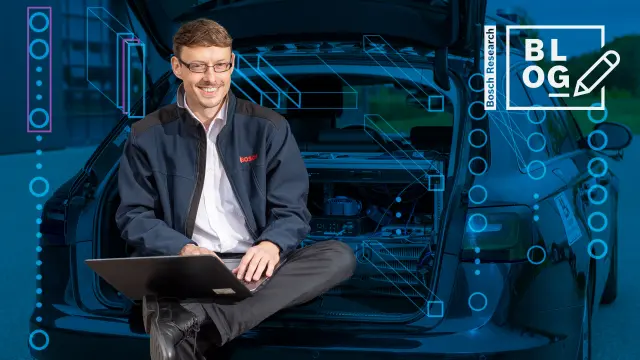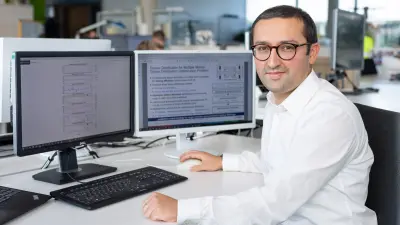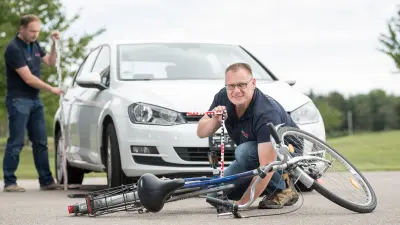Dr.-Ing. Thomas Michalke
Project Leader for Automated Driving Systems for Dense Real-World Traffic on Highways, Inter-Urban and Inner-City Roads
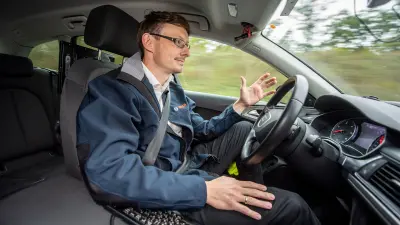
As a systems engineer, I have been working on the challenging task of automated driving for 15 years. During the course of my Ph.D. with the Honda Research Institute in Offenbach, I researched the roots of human intelligence and the plasticity of the human brain together with an interdisciplinary team. One of the tangible applications of my work on a system that works in a “brain-like” or “human-like” manner was the creation of an “attentive co-pilot” that supports humans in the task of driving. As a trainee at Daimler AG with a focus on R&D for automated driving, I became closely acquainted with the perspective of a vehicle manufacturer, for whom the challenging task lies in the robust integration of numerous hardware and software modules into the complete vehicle system. Differences in the corporate culture — which were crucial to me — and the strong focus on algorithms by a leading supplier led me to Bosch and into research. Thanks to significant progress in the field of machine learning, I can connect with the conceptual world of my Ph.D. here and, in the process, provide support for guiding our mobility into the future with “technology for life”.
Please tell us what fascinates you most about research.
Our task as researchers is to identify new, disruptive technologies at an early stage by examining their potential as a solution to day-to-day problems. Disruptive technologies such as machine learning are game changers. They change the world by making old solutions obsolete. If we act quickly at Bosch, then we will put ourselves in a position to take part in shaping such technology in cooperation with the international community. Our colleagues in the business units benefit from the practical knowledge developed in Bosch Research and integrate this into exciting products that make the world better and reward Bosch with enthusiastic customers. One practical example is the technology for automated driving in small cars using cost-effective sensors that underwent advance development in Bosch Research, and the algorithms we considered to be effective are currently being integrated into the next generation of control units by developers in the business unit. The results of our research will thus contribute to making driving small cars safer.
What makes research done at Bosch so special?
In contrast to fundamental research in a purely academic context, research in industry is always focused on the concrete application at a very early stage. I know from experience that we have a great deal of creative freedom to think outside the box in comparison with the relevant industrial competitors. Our fantastic corporate culture is also an essential factor for success in this regard. And unlike purely academic research, the work doesn’t end with a mathematically sound, theoretical solution to the problem — i.e., a “stack of paper”. We are only finished when the solution has been implemented in real life and tested as a prototype out there in real traffic, when all aspects of it have been evaluated and understood. This cycle of theory, implementation and testing in real traffic fascinates me again and again every day, and is unique in this quality in the industrial environment.
What research topics are you currently working on at Bosch?
I lead a strong and effective project team at Bosch Research that is working on automated driving for dense real-world traffic. As an example, we answer the question of how automated vehicles need to act in order to force a gap when merging onto a highway in heavy traffic. Current commercial solutions fail when it comes to solving this type of scenario. Like many successful start-ups, we pursue a distinctly hands-on mentality here. If we are unsure which solution is best, early implementation and testing is done in simulations — and even more crucially also in real traffic. “Out there” we learn much more efficiently which scenarios and fields of technology we need to focus on at Bosch Research. This enables us to help our colleagues in the business units bring the perfect automated driving system to market.
What are the biggest scientific challenges in your field of research?
There is a need for research in the field of high-performance prediction approaches for allowing situation analysis in complex traffic scenarios, for example. What does that mean in practice? Commercially available automated driving systems are limited to simple, low-complexity traffic situations such as following a vehicle on the freeway. These systems reach their limits as soon as an interaction occurs between multiple road users. As human beings, we interpret scenarios and predict the future movement of other vehicles using complex learned behavior models. We deduce at a glance that a small car driving in a relaxed manner would remain in the slipstream of a truck — but the fast-moving tradesman’s station wagon probably won’t. We need to solve these and much more complex prediction tasks to reach or even exceed human performance when driving a vehicle automatically. As a tool, machine learning approaches can bring us closer to a full-featured automated system for city centers that is able to solve such prediction tasks.
How do the results of your research become part of solutions “Invented for life”?
In close collaboration with our colleagues in the business units, and based on our practical experience, we are able to identify problem areas in which there is a need for research and in which we are able to establish and evaluate the required technologies. Since we at Research are able to demonstrate the potential for new technology in real-world traffic, a successful transfer of the results to the business units becomes possible (prototype software implementation, evaluation results as part of comprehensive documentation, IP protected for Bosch where applicable). Corporate Research often also supports the integration of the software into the target system, e.g., by answering technical questions or through code reviews. We occasionally support the business units in customer acquisition, too, through driving demonstrations for OEMs (Original Equipment Manufacturer) that enable us to demonstrate the Bosch system expertise throughout the entire processing chain of an automated driving system. The experts in the business units are always the ones who carry out the actual product implementation, but Bosch Research plays a supporting role in many products as the central technological enabler.
Curriculum vitae
Since 2011
Development of automated driving systems, research engineer at Bosch
2009 to 2011
R&D for advanced driver assistance systems and automated driving, trainee at Daimler AG
2006 to 2009
Development of automated driving systems, research engineer at the Honda Research Institute
2006 to 2009
Robotics and automation, research assistant, TU Darmstadt, Chair Adamy
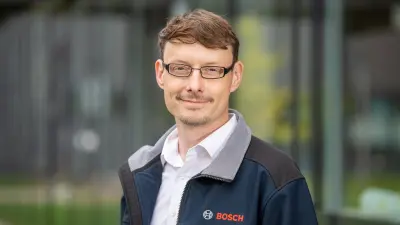
Selected publications

Thomas Michalke et al. (2011)
- Thomas Michalke, Robert Kastner
- IEEE Intelligent Transportation Systems Magazine
- DOI: 10.1109/MITS.2011.941911

Thomas Michalke et al. (2013)
- Thomas Michalke, Claudius Gläser, Lutz Bürkle, Frank Niewels
- IEEE Intelligent Transportation Systems Conference
- DOI: 10.1109/ITSC.2013.6728550

Thomas Michalke et al (2018)
- Thomas Michalke, Frank Niewels, Lutz. Bürkle, Thomas Glaser, Thomas Gussner, Gernot Schröder, Thomas Lich
- Vieweg Teubner, 29. Auflage
- ISBN 978-3-658-23583-3

Thomas Michalke (2010)
- Thomas Michalke
- Fortschritt-Berichte VDI, Ph.D. dissertation, Reihe 12, Nr. 718, VDI Verlag GmbH
Get in touch with me
Dr.-Ing. Thomas Michalke
Project Leader for Automated Driving Systems for Dense Real-World Traffic on Highways, Inter-Urban and Inner-City Roads
